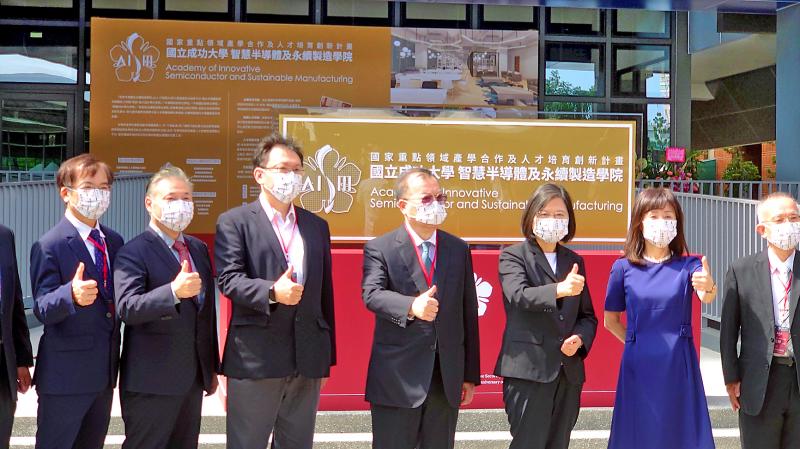National Cheng Kung University’s (NCKU) Smart Semiconductor and Sustainable Manufacturing Institute will hopefully become a model of government-industry collaboration in southern Taiwan, President Tsai Ing-wen (蔡英文) told the institute’s plaque unveiling ceremony yesterday.
The institute’s establishment is expected to foster a new ecology of industry-academic collaboration and serve as a hub that connects actors in the “technology corridor,” Tsai said, referring to links between the Hsinchu Science Park, Kaohsiung’s Ciaotou Science Park, Tainan’s Southern Taiwan Science Park, the Chiayi Science Park and the Pingtung Science Park.
The institute would serve to foster next-generation talent, and drive sustainable and innovative development in southern Taiwan, she said.

Photo: Hung Jui-chin, Taipei Times
With the institute, Taiwan would be well positioned to defend its leading position in the global semiconductor industry, circular economy and smart mechanics industry, Tsai said.
NCKU president Su Huey-jen (蘇慧真) said the university had since 2016 had the nation’s highest number of graduates who pursued a career in the semiconductor sector.
The institute looks forward to offering basic courses on big data and artificial intelligence (AI), which would build a solid foundation for students, Su said, adding that the institute would offer guidance to industry players in the adoption of forward-looking technologies.
The institute is seeking to focus on AI and green energy to establish links to smart machinery, smart manufacturing, circular economy, carbon-neutral technologies, nano-grade material sciences, quantum computing and big data, the university said.
The university is looking forward to working with 14 leading technology companies and taking industry-academic collaboration in southern Taiwan to the next level, it said.
Institute dean Su Yen-kun (蘇炎坤) said that he seeks to overcome the limitations of dedicated departments.
Taiwan must address the lack of homegrown semiconductor talent, which is due in part to the nation’s declining birthrate and China’s efforts to attract Taiwanese professionals, Su Yen-kun said.
Retention of semiconductor talent should be regarded as a matter of national security, he said.

Eight restaurants in Taiwan yesterday secured a one-star rating from the Michelin Guide Taiwan for the first time, while three one-star restaurants from last year’s edition were promoted to two stars. Forty-three restaurants were awarded one star this year, including 34 in Taipei, five in Taichung and four in Kaohsiung. Hosu (好嶼), Chuan Ya (川雅), Sushi Kajin (鮨嘉仁), aMaze (心宴), La Vie by Thomas Buhner, Yuan Yi (元一) and Frassi in Taipei and Front House (方蒔) in Kaohsiung received a one-star rating for the first time. Hosu is known for innovative Taiwanese dishes, while Chuan Ya serves Sichuan cuisine and aMaze specializes

STATS: Taiwan’s average life expectancy of 80.77 years was lower than that of Japan, Singapore and South Korea, but higher than in China, Malaysia and Indonesia Taiwan’s average life expectancy last year increased to 80.77 years, but was still not back to its pre-COVID-19 pandemic peak of 81.32 years in 2020, the Ministry of the Interior said yesterday. The average life expectancy last year increased the 0.54 years from 2023, the ministry said in a statement. For men and women, the average life expectancy last year was 77.42 years and 84.30 years respectively, up 0.48 years and 0.56 years from the previous year. Taiwan’s average life expectancy peaked at 81.32 years in 2020, as the nation was relatively unaffected by the pandemic that year. The metric

Taiwan High Speed Rail Corp. (THSRC) plans to ease strained capacity during peak hours by introducing new fare rules restricting passengers traveling without reserved seats in 2026, company Chairman Shih Che (史哲) said Wednesday. THSRC needs to tackle its capacity issue because there have been several occasions where passengers holding tickets with reserved seats did not make it onto their train in stations packed with individuals traveling without a reserved seat, Shih told reporters in a joint interview in Taipei. Non-reserved seats allow travelers maximum flexibility, but it has led to issues relating to quality of service and safety concerns, especially during

A magnitude 5.1 earthquake struck Chiayi County at 4:37pm today, the Central Weather Administration (CWA) said. The hypocenter was 36.3km southeast of Chiayi County Hall at a depth of 10.4km, CWA data showed. There were no immediate reports of damage resulting from the quake. The intensity of the quake, which gauges the actual effect of a seismic event, measured 4 in Chiayi County, Tainan and Kaohsiung on Taiwan's seven-tier intensity scale, the data showed. The quake had an intensity of 3 in Chiayi City and Yunlin County, while it was measured as 2 in Pingtung, Taitung, Hualien, Changhua, Nantou and Penghu counties, the data